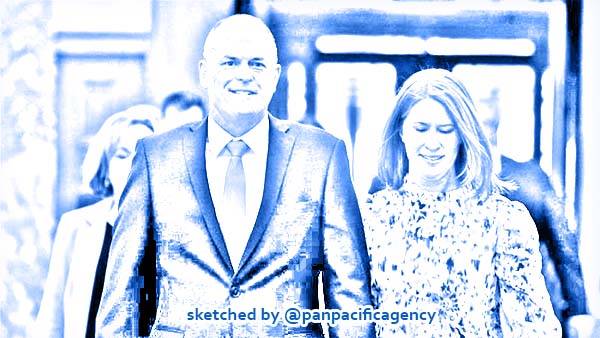New Zealand’s opposition leader Simon Bridges dumped after crash in popularity

Todd Muller, with his wife Michelle, took the leadership if New Zealand's opposition party on Friday after opinion polls suggested New Zealand Prime Minister Jacinda Ardern heading for a huge victory in the September general election [Nick Perry/AP Photo] [The Associated Press]. Sketched by the Pan Pacific Agency.
WELLINGTON, May 23, 2020, The Guardian. The leader of New Zealand’s opposition has been removed by his party in a desperate bid to install a figurehead who can match Jacinda Ardern’s star power in the upcoming September general election, The Guardian reported.
National party MP Todd Muller won a secret party room vote against Simon Bridges, a former criminal prosecutor who recent polls have found to be deeply unpopular with the general public. The vote took less than an hour. Nikki Kaye was chosen as his deputy.
Speaking at a press conference Muller described himself as a man from “heartland New Zealand” and said the nation needed a national government with the “experience and management skills to get our country through the worst crisis since the end of the second world war.”
Muller said he wasn’t interested in playing oppositional politics but he would hold the government to account. While he applauded their management of the Covid-19 crisis as “impressive” and praised Ardern as an “excellent communicator”, he said Labour did not have the skills to lead New Zealand out of an economic downturn, and said the party only had two or three talented MPs in cabinet.
“First and foremost I am about what’s best for you and your family, not what’s wrong with the government,” Muller said.
“My focus as leader is our country’s economic recovery and the strengthening of every community throughout New Zealand.”
“What drives me is the community, the people who help their elderly neighbours with the lawns on the weekend, the dad who runs the food stall at the local school fair, the mum who coaches a local touch rugby team.”
Muller’s deputy Kaye described him as “the most decent person I know” and said he had an extraordinary ability to unite conservatives and liberals within the party.
In the week before the ballot, Bridges rated at just 5% and below, with his party on 30.6%. Meanwhile, Ardern’s popularity has soared to record highs, making her the most popular New Zealand prime minister in a century.
Bridges said his leadership had been “a heck of a ride”. He posted a goodbye message to Kiwis on Twitter, and said he was looking forward to being a “better husband and father” to his family, saying the leadership had taken a toll on them.
“It’s been a blast, I’ve got absolutely no regrets … I am not perfect but its been a privilege”.”
Before the vote on Friday, Muller laid out the premise for his challenge in an email to the 55 National MPs, saying: “Labour has failed to deliver on every measure it has set for itself in government. This will not change and the consequences of it being reelected at this time will be catastrophic for two generations.”
Advertisement
“Our communities and our economy are at stake. It is essential National wins this election. I share the view of a majority of colleagues that this is not possible under the current leadership.”
Throughout the Covid-19 crisis, Bridges has been criticised for his lack of empathy and tone-deaf responses, appearing to pick fights with the government when the public felt he should have been showing solidarity and support at a time of national emergency.
In the balance are the election-year fortunes of a party that dominated parliament for nine years until 2017, but has struggled to mount a challenger who can match the popularity of Ardern.
Ardern’s party polled at 56.5% in Monday’s Newshub Reid research poll, which meant that Labour could govern alone after September’s election in a country where coalition governments are normal. The prime minister had shot to 59.5% in the preferred leader stakes, making her the most popular prime minister in a century.
Muller comes from a business background, with roles at the dairy giant Fonterra and at Zespri, the kiwifruit growers’ cooperative. He hails from a dyed-in-the-wool National party-supporting family and served as an executive assistant to Jim Bolger while he was prime minister in the 1990s.
The Bay of Plenty MP, who lives in the North Island city of Tauranga with his wife and three children, may suffer from having a low profile nationally, opponents of the challenge said.
Kaye is much better known in mainstream New Zealand, partly from her early political battles with Ardern. In 2011 and 2014, the pair went head-to-head for the same electorate seat of Central Auckland, which Kaye won and retains (Ardern now holds a different electorate seat).
The pair captured headlines for their youth – they were both born in 1980 – and popularity. Kaye went on to become an education minister in the previous National government and was treated successfully for breast cancer in 2016.